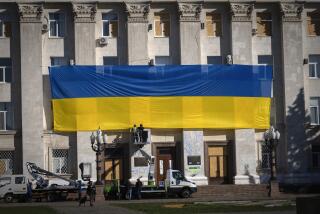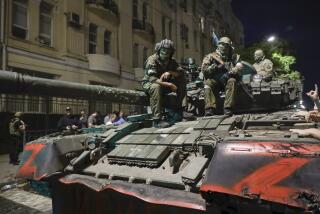Fatigue Thins Chechen Rebels’ Ranks
- Share via
URUS-MARTAN, Russia — Said Adiyev is a 24-year-old Chechen from one of the toughest guerrilla warrior forces in the world, yet with some mighty battles behind him, he has run out of places to take refuge from a vast and powerful enemy.
Exhausted and weak, he has put down his weapon and does not want to fight again.
Adiyev’s is a story of desperation: In February, he spent weeks wandering with other rebels in the mountains of southern Chechnya, freezing, sick and half-starved, living on wild garlic grass, running low on ammunition and medicine.
Dogged by Russian bombers, the men saw their situation grow so dire that, by early March, they abandoned the mountains and descended to the village of Komsomolskoye, 15 miles south of the Chechen capital, Grozny.
But from there, escaping through the Russian lines, across heavily mined terrain, was even more hellish, Adiyev said in an interview in this Chechen town last week.
For the rebels, who are fighting to make their republic an independent state, the battle cry in the war against the Russians has been to fight until the last drop of their own blood is spilled. And as the war pounds on in southern Chechnya, they are having to face the grim choices those words convey.
Many are fighting on, or are merging into the civilian population, to rest and fight another day.
Others have made good their pledge to fight until the end--like a few of the 1,500 rebels trapped in Komsomolskoye last month. Concealing grenades, they walked across to the Russian side in feigned surrender, then blew themselves up in one last effort to kill a few more of their enemies.
But, while Russia mourns the deaths of 37 elite Interior Ministry servicemen killed in a rebel ambush last week, the war also has taken a heavy toll on the Chechen fighters. And some, like Adiyev, have had enough.
With 80,000 Russian troops pitted against a few thousand rebels, the fighters have been forced to break into smaller groups, fleeing from the plains to the southern mountains, then in desperation back to the plains again.
For Adiyev and his unit, the war began well. After Russian ground troops entered Chechnya in late September, the guerrillas let the Russians swoop into the republic’s northern territory while they fortified their capital and resisted in the southern and eastern villages. Even as Grozny came under ferocious Russian attack in January, morale was high.
“We knew the city like the back of our hands and killed inexperienced [Russian] soldiers like grouse on their mating ground,” Adiyev said.
When the rebels finally decided to retreat from Grozny in early February, he was part of a column of between 3,000 and 4,000 guerrillas who marched into the hills, losing a few hundred fighters in minefields. Six times during the hurried retreat, he recalled, they also walked right into Russian lines and had to fight their way out, leaving even more dead warriors behind.
“But we learned the most shocking news only when we got to the mountains,” he said. “There were no food and ammunition bases there. All of them had been found and destroyed by the Russian aviation. It meant the end for us, and all of our plans and hopes crashed. There was nothing left in the mountains but bare rocks and snow.
“All of us were physically exhausted,” Adiyev continued. “We had a lot of wounded and frostbitten men among us. We were starving and some of us were on the verge of breakdown.”
Trapped on a peak and pounded by Russian bombers, the rebels decided to move once again to the plains. About 1,500 men under commanders Arbi Barayev and Ruslan Gelayev entered Komsomolskoye beginning March 5. But as they tried to prepare their defense, they found the village was bare.
“The thing that shocked us most of all was the fact we could not find any gardening tools around--no spades, no shovels, no axes, nothing. Everything had been plundered and taken away. We could not even dig in and fortify our positions. We managed to find only five rusty spades in the whole village,” Adiyev said.
“The Russians had no mercy. They hurled everything at us. We tried to hide, but there were not very many places in town where we could find decent shelter. And we did not have enough ammunition to fire back,” he said.
The battle of Komsomolskoye began March 7 and raged for two weeks as the Russians bombed and shelled the settlement house by house. Rebel casualties were high, including 50 wounded fighters killed in a direct hit on the basement where they were sheltering.
The rebel commanders ordered their men to split into small groups of about 10 each to try to fight their way out. But the escape routes were heavily mined.
“I am the only one who survived in my group of nine people,” Adiyev said. “The rest were killed by Russian booby traps.”
Interviewed in the village of Lermontovo last week, another veteran of the Komsomolskoye fighting, 28-year-old Taus Kirimov, said the rebels, armed mainly with Kalashnikov automatic rifles, were vastly outgunned.
“There were a lot of people who were suffering from severe festering shrapnel wounds, a lot of people with blown-off limbs. It was cold, and all of us were starving,” Kirimov said.
Some of the wounded wanted to surrender to Chechen militiamen fighting on Moscow’s side, but the Russians insisted that the fighters surrender to them.
“After that, our fighters did not have any choice but to take hand grenades, pull the pins out, walk up to the Russians as if surrendering and blow themselves and the invaders up,” Kirimov said. After several such cases, he said, the Russians refused to accept any more surrendering Chechens.
Kirimov decided that his only chance of escape was to travel alone at night. He crept along a river that bisects Komsomolskoye, cutting reeds and floating them downstream.
“There were booby traps everywhere,” he said, “and wherever a reed got stuck, I knew there was an obstacle, most likely a booby trap. I was extra careful in those places, skirting them or stepping over them. That’s what saved my life.”
By dawn, sick, hungry and emaciated, he had reached the next village, Goyskoye.
Alone, Kirimov posed little threat to the civilians he encountered. But earlier, in Komsomolskoye--a settlement of 5,000 people--the rebels’ arrival was bad news for the residents. When the first fighting broke out soon afterward, the population began to flee northward.
“We had no illusions about what the federals [Russian forces] would do if they knew the village was occupied by Chechen fighters,” said Rukman Aliyev, 48, a resident of Komsomolskoye who was interviewed last week in a neighboring village.
The column of refugees was stalled at a checkpoint on the road north for four days, from March 8 to March 12. The Russian forces said women and males younger than 10 or older than 60 could leave, while the rest had to stay--but the women refused to go without their husbands.
On the first day, Russian officers at the checkpoint gave the refugees an hour’s grace to return to the village and collect their belongings before aerial attacks started, Aliyev said.
“Everybody rushed back into the village. But hardly 20 minutes had passed when the bombing began,” he said.
Uvais Pashayev, 65, waited at the checkpoint while his wife, brother and granddaughter returned to retrieve the family possessions.
“They were killed by Russian bombs; what else can I say? It is difficult for me to talk about it,” he said.
Pashayev saw the bodies when he returned during a lull in the bombing. Unable to bury the corpses, he pulled two mattresses over them and left.
“I have no house, no family, no documents. My will is paralyzed. I am alive, physically, but my heart and soul are dead,” he said.
Khazim Tunsoyev, 52, was among the refugees who waited in heavy rain in a muddy field near the checkpoint for four days, collecting rainwater to drink. There was almost no food, he said, and refugees could only watch as Russian forces hauled truckloads of booty out of the village.
Turpal Khasayev, 41, another of the refugees--interviewed last week in Urus-Martan--said the four-day standoff at the Komsomolskoye checkpoint ended only when pro-Kremlin militiamen, some themselves residents of the village, aimed their weapons at the Russian soldiers and told the refugees they could pass.
“The Russians knew our police would shoot to kill if they displayed any violence toward us,” he said.
*
Special correspondent Nunayev reported from Urus-Martan and staff writer Dixon from Moscow.
More to Read
Sign up for Essential California
The most important California stories and recommendations in your inbox every morning.
You may occasionally receive promotional content from the Los Angeles Times.













